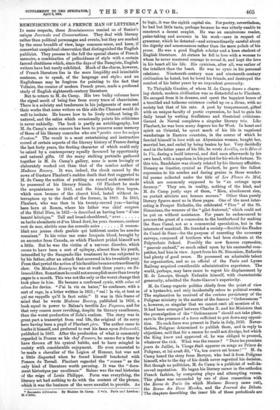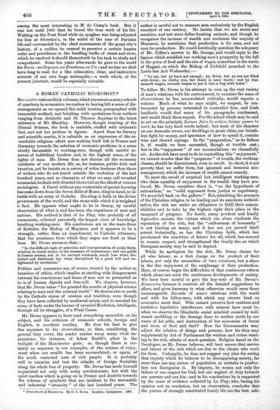REMINISCENCES OF A FRENCH MAN OF LETTERS.* Is some respects,
these Reminiscences remind us of Senior's unique Journals and Conversations. They deal with literary rather than political personages and events, but they are marked by the same breadth of view, large common-sense, and keen, if somewhat unspiritual observation that distinguished the English publicist. They possess to the full the special charm of French memoirs, a combination of pellucidness of style with a certain fecund chattiness which, since the days of the Essayists, English writers have but rarely exhibited. Much of the charm, however, of French literature lies in the mere limpidity.and inimitable neatness, so to speak, of the language and style ; and an Englishman may be forgiven for pointing to the fact that Voltaire, the creator of modern French prose, made a profound study of English eighteenth-century literature.
But to return to M. da Camp. His two bulky volumes have the signal merit of being free from every trace of chauvinism. There is a sobriety and tenderness in his judgments of men and their works that some writers on this side the Channel would do well to imitate. He knows how to be lively without being ill- natured, and the satire which occasionally points his criticisms is never unkindly. The book is partly an autobiography, but M. du Camp's main concern has been to preserve some memory of those of his literary comrades who are " partis avec lee neiges d antan." The result is a most entertaining and instructive record of certain aspects of the literary history of France during the last forty years, the fleeting character of which could only be seized by a contemporary equally favoured by opportunity and natural gifts. Of the many striking portraits gathered together in M. du Camp's gallery, none is more lovingly or elaborately worked out than that of the sombre author of Madame Bovary. It was, indeed, the shock caused by the news of Gustave Flaubert's sudden death that first suggested to M. du Camp the notion of putting on record such memoirs as he possessed of his literary friends. Of Flaubert he made the acquaintance in 1843, and the friendship then begun, which soon became of the closest kind, lasted without in- terruption up to the death of the former, in 1880. In 1843, Flaubert, who was then in his twenty-second year—having been born at Rouen, where his father was chief surgeon of the Hotel Dieu, in 1821—is described as having been " d'ime
beaute herokne." Tall and broad-shouldered, " avec an barbs abondante et d'im blond dorS, lea yeux enormes, couleur
vert de mar, abrites sons des sourcils noire ii ressem- blait aux jeunes chefs ganlois qui lutterent centre lee arm ees romaines." In his veins ran some Iroquois blood, brought by an ancestor from Canada, on which Flaubert prided himself not a little. But he was the victim of a nervous disorder, which seems to have been a sort of epilepsy, almost from his youth, intensified by the Sangrado-like treatment he was subjected to by his father, after an attack that occurred in his twentieth year. From that period the action of his faculties becameextraordinarily slow. On Madame Bovary he was at work three years ; on Sa- lammbo five. Sometime li he could not accomplish more than twenty pages in a month. This was not the only or the worst change that took place in him. He became a confirmed cynic, with solus ad solven for device. " J'ai la vie en haine," he confesses, with a sort of rage, in a letter written in 1851; " oni ! la vie, et tout ce qui me rappelle qu'il la fact snbir." It was in this frame of mind that he wrote Madame Bovary, published in 1856, a book equal in power to Balzac's terrible Les Paysans, and for that very reason more revolting, despite its literary excellences, than the worst production of Zola's realism. The story was in great part a transcript from real life, the original of its sorry hero having been a pupil of Flaubert pre. The author came to loathe it himself, and preferred to rest his fame upon Salanzrabo, published in 1863. After the production of what is commonly regarded in France as his chef d'muvre, he seems for a time to have thrown off his cynical habits, and to have mingled in society with considerable enjoyment. He even consented to be made a chevalier of the Legion of Honour, but was not a little disgusted when he found himself bracketed with Ponson dn Terrail. Flaubert regarded the " roman " as the only kind of literature worth perusing. It was the "docu- ment historique par excellence." Balzac was the real historian of the reign of Louis Philippe. Form was everything, the literary art had nothing to do with the content of the phrase, which it was the business of the mere annalist to provide. As Souvenirs Litldraires. By Maxims da Camp. 2 vols. Paris mil London : H. &Jetts. to logic, it was the eighth capital sin. For poetry, nevertheless, be had but little taste, perhaps because he was utterly unable to construct a decent couplet. He was an omnivorous reader, pains-taking and accurate in his work—save in respect of grammar, which he detested—and extraordinarily careful about the dignity and sonorousness rather than the mere polish of his prose. He was a good English scholar and a keen student of English literature. At sixteen he fell in love with a woman to whom he never mastered courage to reveal it, and kept the love in his heart all his life. His cynicism, after all, was rather of the intellect than the heart. He was no cynic in his personal relations. Nineteenth-century man and nineteenth-century civilisation he hated, but he loved his friends, and destroyed the comfort of his latter years by an imprudent generosity.
To Th4ophile Gautier, of whom M. du Camp draws a charm- ing sketch, modern civilisation was as distasteful as to Flaubert. He escaped from it in dreams, and spent the happiest hours of a troubled and toilsome existence curled up on a divan, with no society but that of his cats. A poet by temperament, gifted with an unique faculty of poetic expression, he had to gain his daily bread by writing fenilletons and theatrical criticisms. Gerard de Nerval completes a singular literary trio. Like Flaubert, he was born many degrees too far West. In heart and spirit an Oriental, he spent much of his life in vagabond wanderings in Eastern countries, in the course of which he fancied himself in love with an Abyssinian woman, bought her, married her, and ended by being beaten by her. Very decidedly mad in the latter years of his life, he wrote Aurelia, on le Rene et la Vie, daring a lucid interval, and died soon afterwards by his own hand, with a napoleon in his pocket for his whole fortune. To this trio, Bandelaire was closely related by his literary affinities. Dreamy as Gautier, cynical as Flaubert, he gave the fullest expression to his sombre and daring genius in those wonder- ful poems collected under the title of Les Flews du Mal, which are commonly supposed to be "an outrage upon decency." They are, in reality, nothing of the kind, and M. du Camp justly says of them, "Bien, absolament riem, ne portait atteinte aux bonnes mceurs." Other than purely literary figures meet us in these pages. One of the most inter- esting is Prosper Enfantin, the celebrated " Pere " of the St. Simonians, the wearers of the " gilet fraternel," which could not be put on without assistance. For years he endeavoured to procure the grant of a concession to the brotherhood for making the Suez Canal, not as a commercial speculation, but in the interests of mankind. He founded a society—Soci4t4 des Etudes du Canal de Suez—for the purpose of executing the necessary surveys, composed of brethren who bad been students at the Polytechnic School. Possibly tha now famous expression, " ponvoir exclasif," so much relied upon by his successful com- petitor, had him in view. Apart from his St. Simonism, Enfantin had plenty of good sense. He possessed an admirable talent for organisation, and as an official of the Paris and Lyons Railway acquired considerable administrative experience. The world, perhaps, may have cause to regret his displacement by M. de Lesseps, though Enfantin himself, with characteristic generosity, admitted the Scoto-Gascon's superiority.
M. du Camp regards politics chiefly from the point of view of a bystander, and only incidentally refers to political events. The explanation he received of the curious persistency of the Polignac ministry in the matter of the famous " Orclonnances " s, however, so singular that we cannot omit all mention of it. It had been arranged between Charles X. and his Ministers that the promulgation of the " Ordonnances " should not take place, save in the presence of a force sufficient to put down any opposi- tion. No such force was present in Paris in July, 1830. Never- theless, Polignac determined to publish them, and in reply to objections, said that fOr a reason he could not divulge, but which the 1Ctig knew and approved of, he was obliged to proceed, whatever the risk. What was the reason ? "Dana lea premiers jonrs de Jnillet, la Vierge etait apparue en songe an Prince de Polignac, et lni avait dit, • Va, ton cenvre eat bonne ! ' " M. du. Camp heard the story from Berryer, who had it from Polignac himself, who to the day of his death never regretted his decision. But though no politician, M. du Camp is a publicist of well-de- served reputation. Be began his literary career in the orthodox French fashion, by composing plays and attempting verges. This phase was succeeded by one of close connection with the Revue de Paris (in which Madame Bovary came out), the Revue des Dens Mondes, and the Journal des Debate. The chapters describing the inner life of these periodicals are among the most interesting in , M du Camp's book. But it was not until 1865 that he found the true work of his life. Waiting on the Pont Neuf while an eyeglass was being adjusted for him at Secretan's, in the midst of the roar of Parisian life and surrounded by the chief monuments of the great city's history, of a sudden he seemed to perceive a certain human order and providence in the bustling traffic of street and river, which he resolved it should thenceforth be his task to study and comprehend. Some ten years afterwards he gave to the world his Parts: ses Organes, ses Pcmetions, sa Vie ; and we fear we shall have long to wait -for a like exhaustive, clear, and instructive account of our own huge metropolis,—a work which, at the present juncture, would be especially valuable.















































 Previous page
Previous page